National
Delegate Conference 17-20 June 2008
Conference 2008 - An overview
Working together to face the challenges
by John Stevenson (click highlighted areas for fuller reports)
Raise our people up or our people will bring
you down, was General Secretary Dave Prentis' stark warning
to the government as UNISON's National Conference in June set
out a new ‘working together' agenda to defend public services
and the public service team that delivers them.
Joint working, especially between the big Health and Local Government
services, took centre stage as the Conference laid out strategies
to face up to the challenges of shared services, pay limits, cuts
and privatisation, while celebrating 10 years of the minimum wage
by looking for improvements.
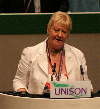 Jane Carolan
Jane Carolan |
 Lilian Macer
Lilian Macer |
Scotland's Jane Carolan and Lilian Macer were key speakers in
the debates. Jane warned that by 2030 we
will be paying £198bn for current PFI contracts for
buildings and equipment, over three times their value. "What
a total waste of public money," she said. "It isn't
just that private services cost more. Privatisation means service
failures. Privatisation leads to fewer jobs, worse pay, worse
conditions."
Lilian stressed the union needed "to
share current and past experiences" to give branches the
tools to face the challenges.
But it is not just the big services that are affected. Delegates
from Higher Education, Energy, Police and the whole range of public
services underlined the need to defend the public service ethos
against the drive for profit.
United pay campaign: Jane also called for joint action
on pay. "If this government truly wants 21st century public
services, then it will have to pay 21st century pay rates But
unions cannot fight these battles alone," she said. The motion
committed us to "a united front, to work with the PCS, the
GMB, NUT, UCU, CWU, Unite and other trade unions."
A campaign against violence to staff was agreed, demanding
better reporting and gathering of figures to assess and address
the problem. This reflects UNISON Scotland's research which shows
huge shortfalls in how, or whether, public authorities monitor
the problem.
Enforce trade union rights: Alan
Bradley, Dumfries and Galloway Branch called on the NEC to continue
to challenge inequality and enforce employment and trade union
rights. Alan paid tribute once again to branch secretary Marion
Stewart and classroom assistant and steward, Elaine North who
won the STUC One Workplace Equalities Award in May for their campaigning
work with classroom assistants.
NHS 60
 Mick McGahey
Mick McGahey |
 John McLaughlin
John McLaughlin |
How often do we need reminded that public services were made
public all those years ago precisely because private, profit based
service delivery dismally failed?
And how better could that have been demonstrated than by the
celebration of the NHS's 60th birthday? Scotland -
where the first ever NHS hospital came into operation - was to
the fore again in the debate.
Slamming PFI and privatisation, Lothian
Health's Mick McGahey reminded us that, "The NHS is not
bricks and mortar. It is not about who manages it. It's about
the staff who work in it, who provide the services to patients
and who are dedicated to it."
It is hard to imagine now that some of our grandparents were
born at a time when money - and class - dictated how or whether
you got basic medical treatment.
Public services are about people. The people who depend on them
and the people who deliver them.
South Lanarkshire's John McLaughlin,
a home carer, couldn't have underlined that - and the real effect
of privatisation - better when he asked, "Would we rather
big business looked after our mums and dads, or dedicated carers?"
James Clancy, President of Canadian
public services union NUPGE told Conference that public services
define a country and its communities.
Organisation
But we can't challenge any of this if we are not organised ourselves.
That's why decisions on updating our organisation and recruitment
strategy, UNISON's democratic structures and our political fund
were also key debates.
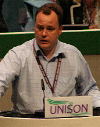 Chris Stephens
Chris Stephens |
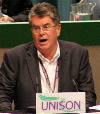 Mike Kirby
Mike Kirby |
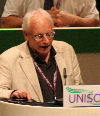 John Stevenson
John Stevenson |
The biggest challenge in the union's
history has been the fight for equal pay and the Conference
threw its weight behind a funding formula to meet that challenge.
Moving the motion, Glasgow's Chris Stephens warned, "It
is only through a collective approach from UNISON that we can
resource the challenge that we face in securing equal pay for
our members."
Scottish Convenor Mike Kirby hammered home
the need to review our 10 year old structures and update them
to meet the challenges of the 21st century, not least
in terms of how we relate to devolved government across the nations.
It was about developing UNISON's unique democracy. It was about
rights but also responsibilities. Most of all it was about members
getting involved in the union at all levels. Key to it is the
involvement of branches in policy making and delivering those
policies as one union
"This union thrives. This union grows. It engages not only
its members. It engages the community in which our members work.
We set that agenda, that action plan through our debates, our
lay democracy and work in partnership with staff to deliver. But
we live in a changing political world and our processes require
periodic review", said Mike.
Backing a six-point recruitment and organisation plan, Edinburgh's
John Stevenson underlined the need for support for the ‘nuts and
bolts' work of the union. "There is no better way to
recruit a new member than by word of mouth from a fellow worker
who has something to thank the union for", he told Conference.
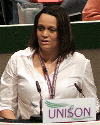 Davena Rankin
Davena Rankin |
And Davena Rankin from Glasgow Caledonian
University persuaded Conference to reduce new members' qualifying
time for legal support to four weeks. Giving early support to
members had led to UNISON being "the biggest union on campus".
Conference backed a review of the union's political fund, rejecting
a misleading motion that suggested every member's money went to
the Labour Party. In fact, only those members who pay into the
‘affiliated fund' pay anything to Labour, while the ‘general'
campaigning political fund has no party affiliation. Both are
essential to the union's campaigning agenda.
 Gordon McKay
Gordon McKay |
Ayrshire and Arran Health's Gordon McKay
called for more members to get directly involved in building Labour
policies that defend public services. "What we need is a Labour
Government that builds council houses, a Labour Government that
brings the railways back into public ownership, and a Labour Government
that builds schools and hospitals through public sector financing
rather than the waste and corruption of PFI.
"Comrades, to do that we don't need a review of the APF levy
by those who don't pay the APF levy. What we need are more levy
payers who campaign for UNISON policies within Labour and only
select and reselect Labour Parliamentary candidates who support
UNISON policies."
Social responsibility - challenging racism, gun and knife
crime, pensions
As a union we have a responsibility to members but we also have
a wider social responsibility.
Without that over the last 100 years, we wouldn't have won many
of the rights and equalities we now enjoy - and we wouldn't have
our NHS.
Conference heard harrowing accounts from
people directly affected by the rise in gun and knife crime,
as relatives of victims and as public service workers dealing
with the human pain. A measured motion sought to address the causes
in communities rather than overreacting to the results which can
make the problem worse.
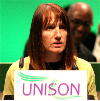 Maggie Jack
Maggie Jack |
 Sofi Taylor
Sofi Taylor |
Maggie Jack, Glasgow City, a first time speaker at conference,
said, "UNISON has to be at the forefront of a campaign for investment
in young people as opposed to legislation that penalizes them,
but must also put pressure on employers to introduce adequate
and effective measures to protect front-line workers from the
increasing threat of violence."
There is no greater threat to equality than the lies and myths
peddled by the far right and Conference was united in challenging
that head-on, pledging to continue campaigning in communities
and backing ‘Show Racism the Red Card".
Equal rights for migrant workers do
not just protect them, they protect all workers and, as Conference
met, UNISON Scotland's Sofi Taylor was launching a charter for
these workers at the Scottish Parliament.
Pensions: Marking 100 years of the state pension delegatesoverwhelmingly
backed a retired members' motion for the union to push for an
immediate and substantial increase in the basic state pension
to £138 a week. They also backed a call for a Responsible
Contractor Investment Policy in Public Sector Pension Funds.
International
In a global economy, unions have to think globally. UNISON has
a proud tradition of international solidarity and its long support
for justice in South Africa was updated as we celebrated honorary
UNISON member Nelson Mandela's 90th birthday.
 Angela Lynes
Angela Lynes |
Zimbabwe, Palestine, Burma and Colombia were all on the agenda.
We heard of the life and death struggles
of trade unionists in Colombia as UNISON pledged support for
the Colombian Solidarity Campaign. While some of us face victimisation
or even the loss of our job, Colombian trade unionists face death
for their activity. Scotland's Angela Lynes told Conference, "In
February, some 70 NGOs, trade unions and other social organisations
reportedly received e-mail death threats from paramilitaries."
The tragic situation in the Gaza siege was reflected
in a call to continue working with Palestinian and Israeli trade
unions to promote dialogue and the peace process and to campaign
to bring a concrete change in the policies of the British government
and European Union, starting with an end to the arms trade between
Israel, Britain and the EU.
Scotland in debates
You can't be serious all the time at Conference - though some
try - and Edinburgh's John Stevenson
had Conference rolling in the aisles in his ‘what you can do in
a minute' speech in the rules debate. Funny though it was, the
speech had a serious point about Conference organising itself
and taking debates seriously.
Again this year, Scotland contributed hugely to that. Scottish
contributions avoided the ‘one speech fits all' temptation others
seem unable to resist.
Perhaps it is from having such an active Scottish Council where
branches meet three times a year and debate issues that our speakers
do so well at Conference. Perhaps it is from a solidarity that
crosses political camps.
Whatever it is, our speakers stood out in bringing knowledge
of their subject, a real involvement in lay activity and a real
sense of debate to the Conference. On more than one occasion they
won hearts and minds, not just votes.
........................................................................
top
KUKRXX3 |



